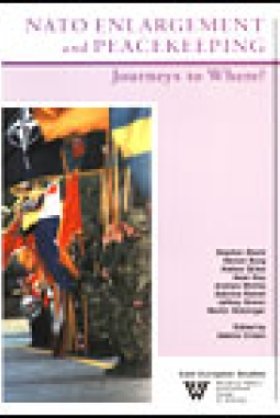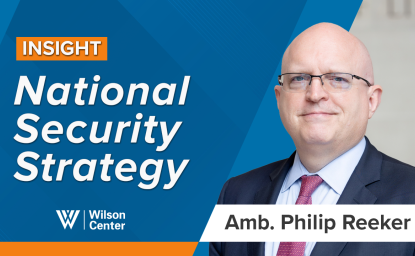"NATO Enlargement and Peacekeeping: Journeys to Where?"


Given the importance of the twin challenges - the MAP and NATO enlargement as well as the future of peacekeeping in the Balkans - not only for NATO but for all the countries of Central and Eastern Europe, the East European Studies Program (EES) at the Woodrow Wilson Center organized substantial seminars on each of these issues in late 2000 and early 2001. Participants in each of these seminars included both experts in residence at the Wilson Center and pre-eminent scholars in the field, all of whom shared important insights and perspectives on these two timely and pivotal issues.
This report brings together the highlights of these sessions, seeking to provide useful insights on and analyses of these issues to those who were unable to attend the actual events. In this publication, we aim to bring together the key views on NATO enlargement and its peacekeeping record presented at the Center over the past few months. Some of these views are supportive while others are very critical of Western and NATO's policy toward the Balkans in particular and enlargement in general. The intent of this report is to compile a non-partisan, balanced record of views on events in the region, as well as on U.S. and NATO policy, as presented by a distinguished group of academics and policy experts. This volume of presentations on two key challenges confronting NATO is intended to serve as a useful and timely complement to EES' publication of the proceedings of its April 19, 2000 conference entitled NATO and Europe in the 21st Century: New Roles for a Changing Partnership.
CONTENTS
INTRODUCTION (PDF 14KB)
Martin Sletzinger and Sabina Crisen
KEY TERMS (PDF 3KB)
PART I. NATO ENLARGEMENT & THE MEMBERSHIP ACTION PLAN
THE NEXT ROUND OF ENLARGEMENT (PDF 2580KB)
Jeffrey Simon, Senior Fellow, Institute for
National Strategic Studies, National Defense University
POLAND, HUNGARY AND THE CZECH REPUBLIC IN NATO: PRODUCERS OR CONSUMERS OF SECURITY? (PDF 1935KB)
Andrew Michta, Mertie Willigar Buckman Professor of International Studies, Rhodes College, TN, and Wilson Center Public Policy Scholar
NATO'S OPEN DOOR: INNER-ALLIANCE DYNAMICS AND THE EUROPEAN UNION (PDF 933KB)
Sean Kay, Professor, Department of Political Science, and Chair of the International Studies Program, Ohio Wesleyan University, OH
IN THE MIDDLE OR ON THE PERIPHERY: CENTRAL EUROPE AFTER NATO ENLARGEMENT (PDF 1277KB)
Andrew Michta, Mertie Willigar Buckman Professor of International Studies, Rhodes College, TN, and Wilson Center Public Policy
Scholar
MAP READING: NATO'S AND RUSSIA'S PATHWAYS TO EUROPEAN MILITARY INTEGRATION. A SYNOPSIS (PDF 1118KB)
Stephen Blank, National Security Affairs Analyst, Strategic Studies Institute, U.S. Army War College Carlisle Barracks, PA
PART II. NATO & THE RECORD ON PEACEKEEPING IN THE BALKANS
KFOR'S RECORD IN KOSOVO (PDF 606KB)
Sabrina Ramet, Professor, Department of International Studies, University of Washington, WA, and Wilson Center Fellow
NATO AFTER THE KOSOVO CAMPAIGN AND THE KFOR PEACEKEEPING OPERATIONS: WHAT HAS CHANGED? (PDF 1790KB)
Andrew Michta, Mertie Willigar Buckman Professor of International Studies, Rhodes College, TN, and Wilson Center Public Policy
Scholar
FIVE YEARS AFTER THE DAYTON PEACEKEEPING ACCORDS: WHAT HAS CHANGED? (PDF 7891KB)
Steven Burg, Professor and Chair, Department of Politics, Brandeis University, Waltham, MA
BOMBING TO BRING PEACE (PDF 436KB)
Aleksa Djilas, Independent scholar, Journalist and Author, Belgrade, Serbia, and former Wilson Center Public Policy Scholar
Author

Global Europe Program
The Global Europe Program is focused on Europe’s capabilities, and how it engages on critical global issues. We investigate European approaches to critical global issues. We examine Europe’s relations with Russia and Eurasia, China and the Indo-Pacific, the Middle East and Africa. Our initiatives include “Ukraine in Europe”—an examination of what it will take to make Ukraine’s European future a reality. But we also examine the role of NATO, the European Union and the OSCE, Europe’s energy security, transatlantic trade disputes, and challenges to democracy. The Global Europe Program’s staff, scholars-in-residence, and Global Fellows participate in seminars, policy study groups, and international conferences to provide analytical recommendations to policy makers and the media. Read more

Explore More
Browse Insights & Analysis
Insights: Ambassador (ret.) Philip Reeker – Europe & the U.S. National Security Strategy

360° View of How Southeast Asia Can Attract More FDI in Chips and AI

The Growing Transatlantic “Big Tech” Rift Explained
